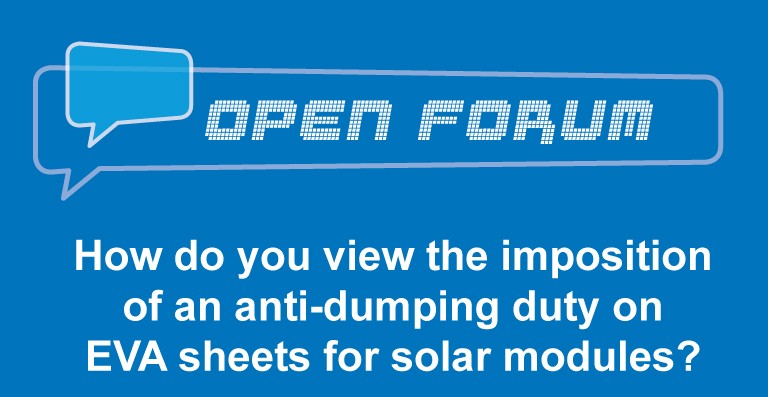How do you view the imposition of an anti-dumping duty on EVA sheets for solar modules?
By EPR Magazine Editorial June 8, 2019 3:13 pm IST
By EPR Magazine Editorial June 8, 2019 3:13 pm IST


Sharad Mahendra, COO (Energy Business), JSW Energy Limited
It is not anti-dumping on the solar modules, it is basically a safeguard duty, which has been implemented on a reducing basis. From July onwards, it will be 20 per cent and from January 2020 onwards, it will be 15 per cent up to July 30 and after that, there will be no duty. It’s a short term measure that has been taken. As a user, I feel that the implemented duty will increase the power cost. The DISCOMs and everyone is looking for that kind of implementation, especially when electrification is happening in India to reach out to the rural mass; also considering the cost. So, with the kind of plans which India has for solar capacity addition, there is not enough module manufacturing capacity. So, we need to reduce the capacity addition target and implement import duties so that only domestic industries can survive and supply. So, this short term measure that has been taken will definitely result in increased tariff cost.

Amit Bajpayee, Solar Energy Adviser, Agni Solar Systems Pvt. Ltd.
It is not anti-dumping on the solar modules, it is basically a safeguard duty, which has been implemented on a reducing basis. From July onwards, it will be 20 per cent and from January 2020 onwards, it will be 15 per cent up to July 30 and after that, there will be no duty. It’s a short term measure that has been taken. As a user, I feel that the implemented duty will increase the power cost. The DISCOMs and everyone is looking for that kind of implementation, especially when electrification is happening in India to reach out to the rural mass; also considering the cost. So, with the kind of plans which India has for solar capacity addition, there is not enough module manufacturing capacity. So, we need to reduce the capacity addition target and implement import duties so that only domestic industries can survive and supply. So, this short term measure that has been taken will definitely result in increased tariff cost.

Shashi Shekar, MD, Camfil Air Filteration India Private Limited
The government recently notified the imposition of anti-dumping duty on EVA sheets for solar modules imported from China, Malaysia, Saudi Arabia, and Thailand for five years. This is second such measure after similar duties were imposed on imports of PV module glasses few years back. Like glass, EVA is an important component of the PV module, thus, any duty on it is bound to send ripples across the industry. The immediate effect could be accessed from the fact that domestic manufacturing cost of modules would be increased. Like other components in the modules, domestic manufacturing still heavily relies upon foreign imports. Today, on one hand where the government is trying to attract Make in India in solar PV manufacturing through numerous tenders and policies, this anti-dumping imposition would certainly be accounted as a deterrent in boosting the domestic manufacturing. The number of suppliers for EVA within India is a select few and that is certainly not enough to cater the entire local industry. Once the domestic manufacturing picks up and companies from outside set up their units, they would be short of options. There would be effects on production cost as well as over reliance on few suppliers that could lead to delays and lags. EVA is one of the critical components as far as module performance and longevity is concerned, thus, there should be wide range of options available to manufacturers for evaluation and decision.
We use cookies to personalize your experience. By continuing to visit this website you agree to our Terms & Conditions, Privacy Policy and Cookie Policy.